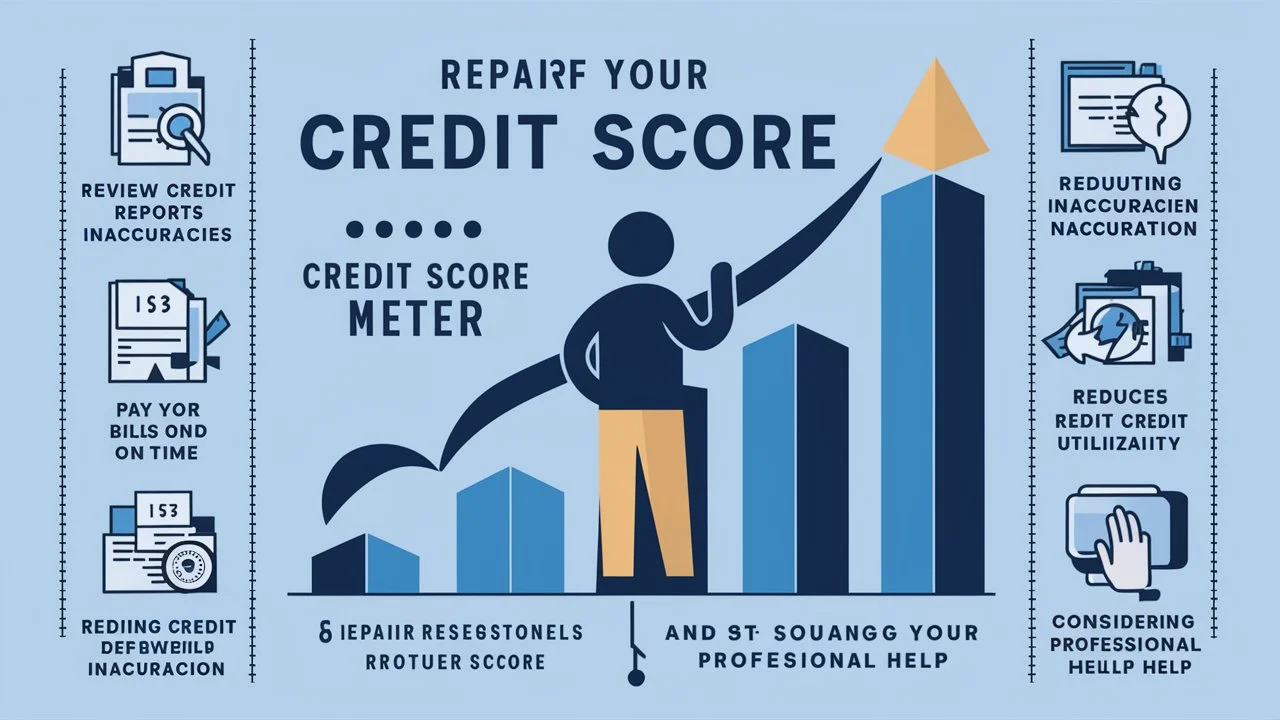How To Repair Your Credit Score Yourself?

What You Should Do to Fix Your Credit Score on Your Own
A good credit score helps in the approval of loans, credit cards, mortgages, rental applications, or any financial credit. However, if you have experienced some financial difficulties in the past, you may be struggling with the credit constraints that come with a low credit rating. The good news is that there is something that you can do to fix your credit and increase your score on your own without using the services of a credit repair company. After some time and effort, it is possible to learn how to delete negative records, introduce new positive information, and, in general, influence the situation with your credit.
Check Your Credit Reports The first action involves reviewing credit reports from Equifax, Experian, and TransUnion. You can get these once per year for free at annualcreditreport.com to check your reports from all three credit bureaus and see if there are any incorrect entries or if there are entries that look suspicious. The first thing you need to check is the list of your personal information and accounts on each report. Notice and jot down all the adverse entries, including payments made a few days to thirty-six months before the date of the credit report, collection accounts, bankruptcy records, or any other adverse data listed. Also, identify if there is any information that appears to be incorrect or fake. If any mistake or fraudulent account is committed, then you can challenge it through the credit bureau.
Learn What Affects Your Credit Rating It is important to know what goes into the making of one’s credit score before one starts working on fixing it. The most important factor in credit scoring is the payment history over some time, and it contributes to more than one-third of the credit score. Having several payments that are late or items that are in the collection can hurt your score. Credit utilization ratio also comes into play here, this examines how you are utilizing your credit limit. Ideally, this should be below 30%. Other considerations are the average age of credit histories, the number of accounts opened, credit type, namely the range of credit products, and credit inquiries. With this understanding, you are in a position to know where to concentrate on when it comes to credit repair.
Mistaken or Fake Information If you have evidence of any mistakes, misinformation, or fake accounts in your credit reports, report the issue to each bureau. Draft the letters of dispute to Equifax, TransUnion, and Experian, identifying each item you wish to contest as inaccurate. It is advisable to give as many supporting documents as possible. The credit bureaus are legally required to investigate the case within 30-45 days. This can enhance your score by eradicating negative records that should not be on your report in the first place.
Reduce Existing Debt and Do Not Incur New One One of the most effective methods of credit repair is to ensure that credit card balances are low and about the credit limit. This is beneficial in that it helps to ensure that your credit utilization ratio is lower. Just remember not to seek unnecessary new credit inquiries when you can help it – you lose a few points for every hard inquiry made on your credit file. Avoid applying for credit and new loans as often as before while working on fixing your credit. Make timely payments for all current credit accounts in the future—enrolling for automatic payments is advisable. Pay off existing credit cards to the current state and maintain making at least the minimum payment on or before the due date.
Become an Authorized User One way to possibly increase your credit score is by getting added as an authorized user to someone else’s credit card – it could be a relative or your significant other with a good credit history. This can help to increase your credit score because it adds positive payment info to your history, expands your total credit limit, and decreases your overall utilization. Nevertheless, ensure that the primary cardholder has been paying his or her bills as due while not charging a large balance. And know that if the first user fails, that information may appear on your credit history as well.
Consider Secured Credit Cards Requesting new secured credit cards in the first name can also be useful if you do have little or no active credit. Secured credit cards work with a cash deposit where the amount deposited works as your credit line in case you fail to make your payments. It is also active like any other card by providing information on the secured card activity to the major credit bureaus every month. Paying credit card balances on or before the due date is reflected on your credit reports as positive and can boost your score big time. Just ensure that any card you open does not have an annual fee because this will, in a way, negate any improvement on the score.
You can see, yes, fixing your credit does take a little work, but it is possible with the right amount of time and dedication to these credit-rebuilding techniques. Check it for free, remain consistent with your new healthy behaviors, challenge inaccuracies, and see your figure go down over a few months. So, be patient but consistent, and continue practicing proper credit management over and over to finally feel the difference – the repair and rebuilding of your credit.
Ready to boost your credit score? Call +1 888-804-0104 now for the best credit repair services near you! Our expert team is here to help you achieve financial freedom and improve your credit. Don't wait—get started today!



